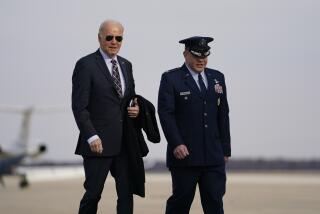Laura Bush Addresses State of Afghan Women
CRAWFORD, Texas — Seeking to draw attention to the treatment of women and children in Afghanistan, the White House assigned President Bush’s weekly Saturday radio address to First Lady Laura Bush, who said the war on terrorism was “a fight for the rights and dignity of women.”
Her speech--the latest in a series of steps by the first lady toward a more public role--was coordinated with the release of a State Department report condemning conditions for women and children in Afghanistan under the Taliban and the Al Qaeda terror network.
The broadcast marked the first time a presidential wife has given the entire radio address alone. In June, the first lady delivered a portion of the weekly speech, in a commemoration of Father’s Day. Nancy Reagan and Hillary Rodham Clinton also joined their husbands in delivering radio addresses.
Though Bush’s remarks and the State Department report contained little new information, they served to spotlight conditions that the administration believes should help it gain international support for the U.S.-led campaign in Afghanistan.
With the regime “in retreat across much of the country,” she said, “the people of Afghanistan, especially women, are rejoicing.”
“The plight of women and children in Afghanistan is a matter of deliberate human cruelty, carried out by those who seek to intimidate and control.”
The first lady said the “brutal oppression of women” was one of the terrorists’ central goals.
She said 70% of Afghan people are malnourished and one in four children, lacking health care, won’t live past age 5. Women are denied access to doctors and have not been allowed to work outside their homes or leave their homes unescorted, she said.
“Muslims around the world have condemned the brutal degradation of women and children by the Taliban regime.”
In Afghanistan, “we see the world the terrorists would like to impose on the rest of us,” Bush said.
Saying the campaign to protect women should not stop with the military success in much of Afghanistan, the first lady said the terrorists “now plot and plan in many countries.”
“They must be stopped,” she said. “The fight against terrorism is also a fight for the rights and dignity of women.”
Immediately after her speech, the State Department released an 11-page report on the Taliban’s “War Against Women.” The report, issued by the department’s Bureau of Democracy, Human Rights and Labor, said the systematic repression of women in Afghanistan was “particularly appalling.”
“Islam is a religion that respects women and humanity. The Taliban respects neither,” the report said. “The Taliban perpetrated egregious acts of violence against women, including rape, abduction and forced marriage.”
The report cataloged the abuses women faced under the Taliban: no schooling for girls older than 8, minimal access to medical care, and a restrictive dress code that mandated the wearing of burkas--garments that cover women from head to toe.
The Taliban closed the women’s university and forced women to quit their jobs, the report said. The regime decreed that women could no longer walk on the streets unescorted. Windows in houses were painted over to prevent outsiders from looking in. Singing, stuffed animals and dolls were banned.
The report said the U.S. government supports a post-Taliban government in Afghanistan that would include women.
In a statement released Saturday, Amnesty International officials agreed with the sharp criticism of the Taliban’s “systemic torture and abuse of women.” But the human rights group cautioned that neither the first lady nor the State Department mentioned “that the Northern Alliance does not have a perfect record with regard to women’s rights.”
The Northern Alliance has been fighting the Taliban and now controls much of Afghanistan.
“In fact, there are even more documented cases of women raped by members of the Northern Alliance than there are by the Taliban,” said Alex Arriago, director of government relations for Amnesty International USA.
*
Gerstenzang reported from Crawford and Getter from Washington.
More to Read
Get the L.A. Times Politics newsletter
Deeply reported insights into legislation, politics and policy from Sacramento, Washington and beyond. In your inbox three times per week.
You may occasionally receive promotional content from the Los Angeles Times.










